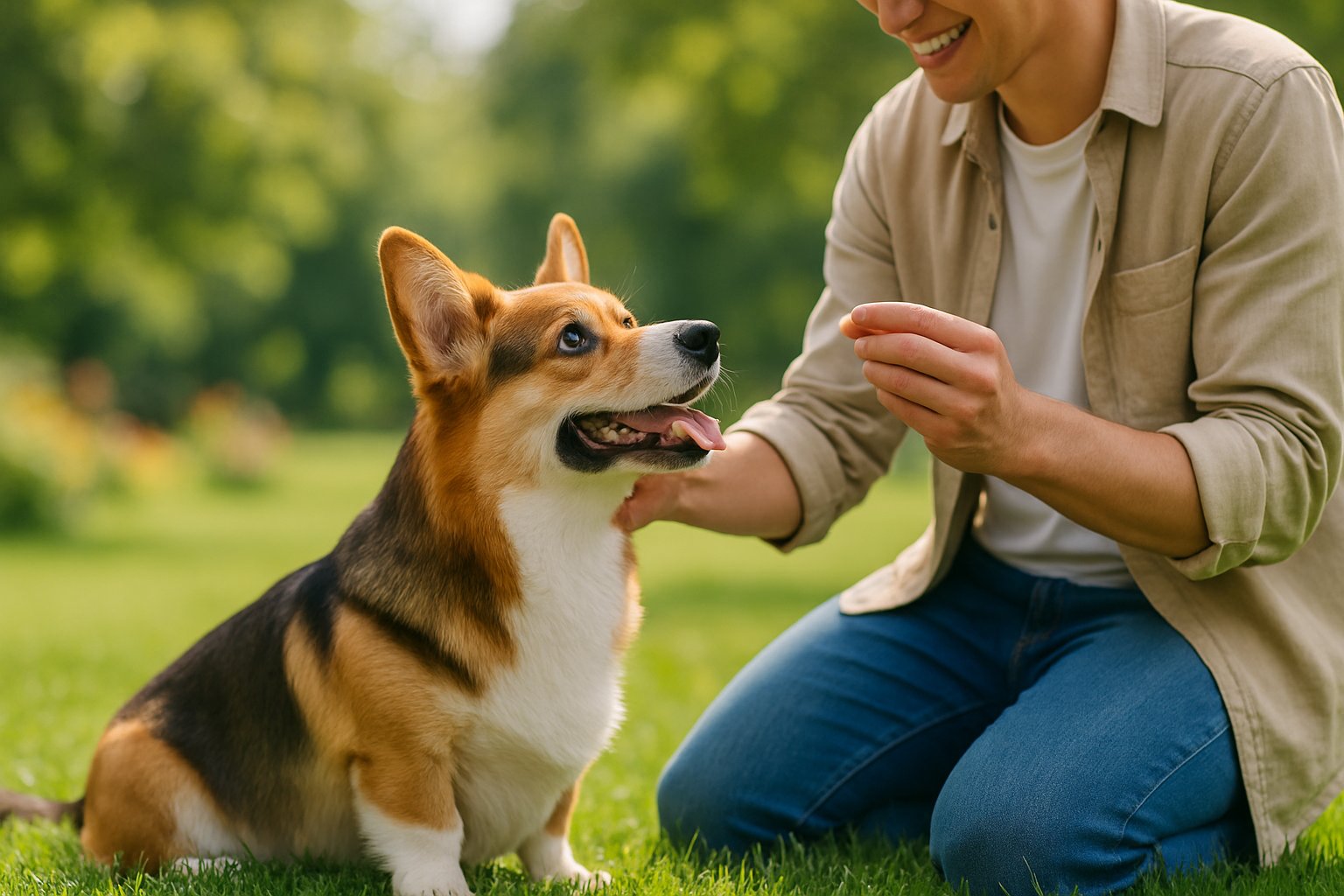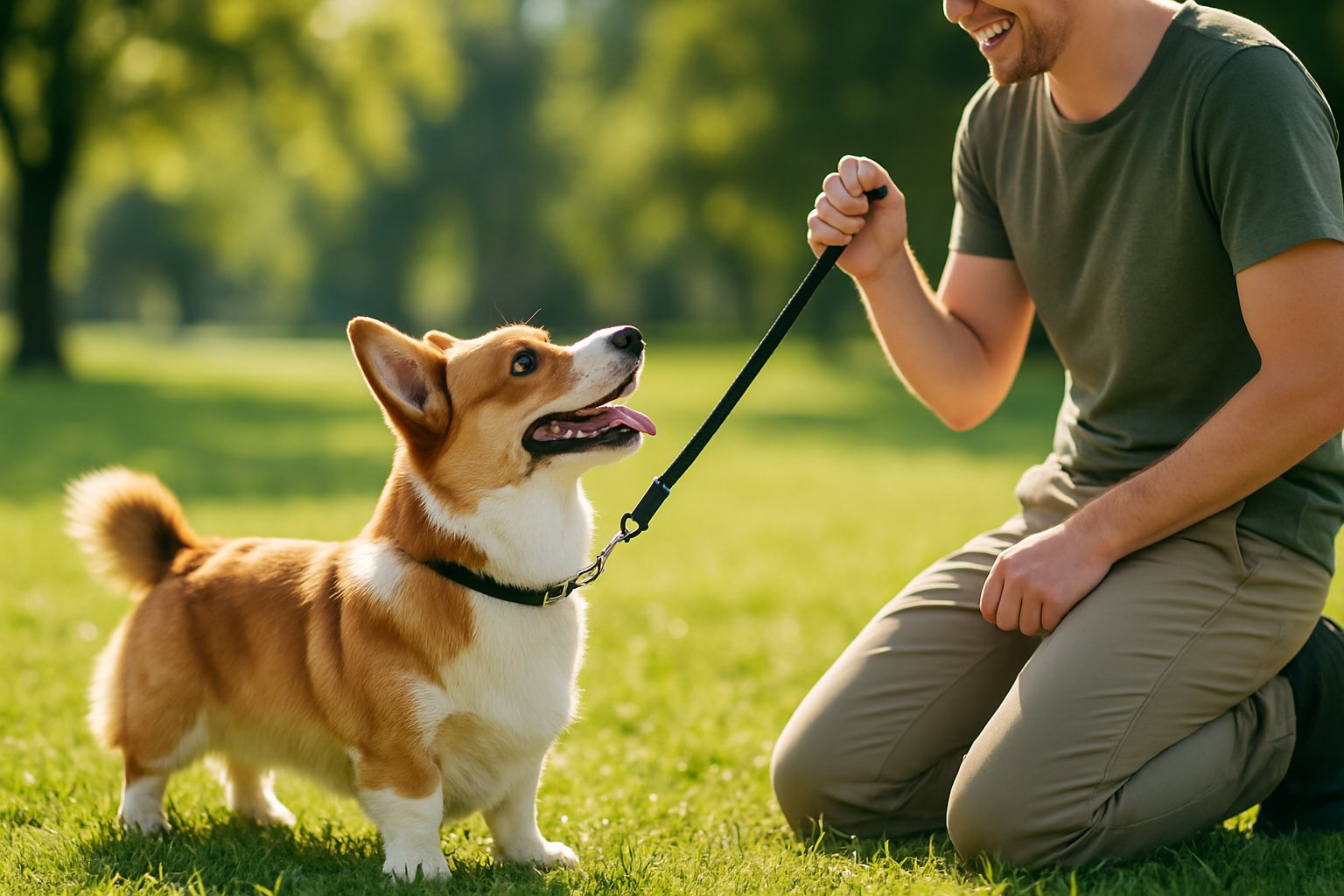Training your Cardigan Welsh Corgi can help you build a healthy relationship and a well-mannered pet. These dogs are smart, energetic, and love learning new things.
Knowing how to train your Cardigan Welsh Corgi makes everyday life smoother and more enjoyable for both you and your dog. By learning the best ways to teach your Corgi, you can set them up for good behavior and a happy home life.
1. Establish a consistent daily routine including feeding, potty, play, and rest times
- Your Cardigan Welsh Corgi benefits from a steady daily schedule. Having regular times for feeding, potty breaks, play, and rest helps your dog know what to expect each day.
- Set firm times for meals and stick to them. Consistent feeding times help with digestion and make it easier to predict potty needs.
- Take your Corgi outside for bathroom breaks at the same times every day. This encourages good potty habits and reduces accidents inside the house.
- Plan time for play and exercise to help manage your dog’s energy and support healthy behavior. Short, fun training sessions mix well with play for a smarter, happier pet.
- Designate a quiet time each day for your dog to rest. Enough rest is key for growth and well-being.
- A routine makes your Cardigan Welsh Corgi feel secure and helps shape positive habits. Regular schedules also support emotional and social growth, making it easier for your dog to adjust to new things. Learn more about how routines help dogs thrive from this guide on establishing normal routines.
2. Use positive reinforcement with treats and praise to encourage good behavior
- When training your Cardigan Welsh Corgi, positive reinforcement works well. This method means you reward your dog right after it does something you want. Rewards can be treats, toys, or simple praise—whatever your Corgi responds to best.
- Timing matters. Give the treat or praise the moment your Corgi follows a command, like “sit” or “stay.” This helps your dog connect the good action to the reward. Corgis are smart but can be stubborn, so consistency is important.
- Use small treats to avoid overfeeding. Make training fun by mixing treats and praise. If your Corgi enjoys toys, you can use playtime as a reward too. Dogs like Cardigans are eager to please, and this method builds trust between you and your dog.
- Positive reinforcement methods are effective and encourage your dog to repeat good behaviors. This approach is recommended by many trainers and animal groups. It helps your Corgi feel confident during learning and makes training enjoyable.

3. Start crate training early to create a safe, comfortable space for your puppy
- Crate training is important for Cardigan Welsh Corgi puppies. It creates a safe place where your puppy can relax and feel secure, while also giving you peace of mind when you can’t watch them closely.
- Start crate training as soon as you bring your puppy home. Young Corgis learn routines quickly, so the earlier you begin, the easier it is for them to adjust. Keeping training sessions short at first can help prevent your puppy from feeling overwhelmed or frustrated.
- Let your Corgi explore the crate with the door open. Place treats or a favorite toy inside to encourage your puppy to go in and out on their own. Avoid using the crate as a punishment, so your puppy sees it as a positive space.
- A regular crate schedule supports housetraining and helps your Cardigan Welsh Corgi learn how to settle on their own. Puppies who spend time in their crate are also often less likely to develop destructive habits when left alone. Using a crate for naps and bedtime gives your puppy structure each day.
- If you want more details about daily crate routines and safe setups, review these crate training tips for puppies and a crate training schedule designed for new puppy owners.
4. Focus on leash training to manage their energetic, curious nature effectively
- Cardigan Welsh Corgis are known for their high energy and strong curiosity. Without good leash manners, these traits can make walks difficult. Leash training helps channel their drive into safe, controlled behavior.
- Start by introducing your Cardigan Welsh Corgi to a harness and leash indoors where distractions are minimal. Give rewards and praise for calmness and allowing the leash to be clipped on.
- Practice walking a few steps at a time, using treats to encourage your dog to stay by your side. Be patient and repeat exercises often. Corgis learn well with short, positive sessions.
- If your Corgi pulls or rushes ahead, stop walking and wait for them to return to your side. This teaches that pulling does not result in forward movement. Consistency is key to helping your dog understand what is expected.
- Regular leash training is important because Cardigan Welsh Corgis can be strong-willed and easily distracted by sights and smells. With steady practice, you will have a more enjoyable walk and a well-behaved companion. For more tips, you can read about how to leash train a dog.

5. Incorporate socialization with other dogs and people to build confidence
- Socializing your Cardigan Welsh Corgi is important for their growth and confidence. These dogs are intelligent, but they can be wary of new experiences. Introducing them to different people, places, and dogs helps them feel more at ease.
- Start by going slow. Take your Corgi on walks in different environments. Let them watch and interact with other dogs from a safe distance at first. This helps reduce anxiety and fear over time.
- Use treats and praise when your dog behaves calmly around new people or dogs. Positive reinforcement encourages your Corgi to repeat good behavior. Always make these experiences fun and stress-free.
- Scheduling regular playdates or trips to dog-friendly parks can help your Corgi learn how to be comfortable in groups. The more positive experiences your dog has with others, the more confident they will become in new situations.
- If you need more tips on how to socialize your dog effectively, plenty of resources offer step-by-step advice for all ages. Patience and consistency are key during this process.
- Proper socialization not only builds your dog’s confidence, but it also helps prevent unwanted behaviors. Your Corgi will likely handle changes, visitors, or busy places much better when they have had practice meeting new people and dogs.



